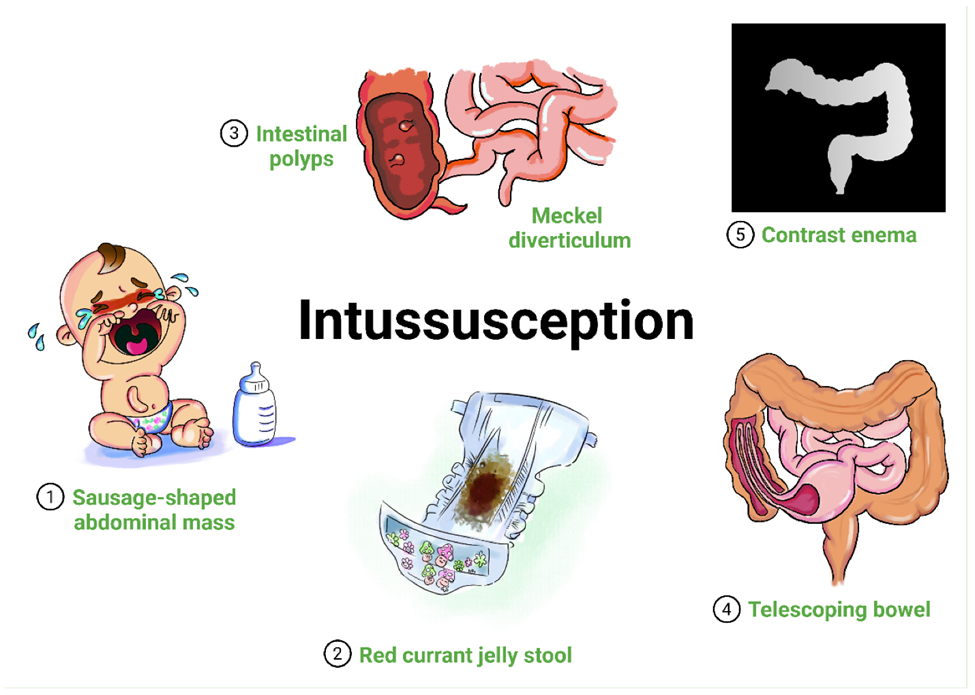The nurse is preparing to care for a child with a diagnosis of intussusception. The nurse reviews the child's record and expects to note which sign of this disorder documented?
Ribbon-like stools
Profuse projectile vomiting
Bright red blood and mucus in the stools
Watery diarrhea
The Correct Answer is C
A. Ribbon-like stools
Explanation: Ribbon-like or pencil-thin stools are associated with conditions affecting the rectum, such as colorectal cancer, but they are not a typical sign of intussusception.
B. Profuse projectile vomiting
Explanation: Profuse projectile vomiting is not a typical sign of intussusception. Vomiting may occur, but it is not the primary characteristic feature.
C. Bright red blood and mucus in the stools
Explanation:
Intussusception is a condition in which one part of the intestine slides into another, causing a blockage. One of the classic signs of intussusception is the presence of "currant jelly" stools, which are characterized by a mixture of bright red blood and mucus in the stools. This occurs due to the compression of the blood vessels in the intestine, leading to bleeding and mucosal discharge.
D. Watery diarrhea
Explanation: Watery diarrhea is not a typical sign of intussusception. The condition is more commonly associated with abdominal pain, vomiting, and the characteristic "currant jelly" stools.

Nursing Test Bank
Naxlex Comprehensive Predictor Exams
Related Questions
Correct Answer is ["90"]
Explanation
The nurse should withhold the dose if the infant's apical heart rate is less than 90 beats per minute.
Digoxin is a medication that can slow the heart rate. If an infant's heart rate is already too slow, administering digoxin can increase the risk of bradycardia, a serious heart rhythm disturbance.
It's important to monitor the apical heart rate for a full minute before administering digoxin to an infant and to withhold the dose if the heart rate is below the specified threshold.
Correct Answer is ["A","C","F"]
Explanation
A. Elevate the extremity on pillows for the first 24 to 48 hours after casting to prevent swelling.
Explanation: Elevating the extremity can help reduce swelling, especially in the initial period after casting.
B. Place a heating pad on the lower end of the cast and over the fingers if the fingers feel cold.
Explanation: Applying heat can increase the risk of burns and is not recommended. If the fingers feel cold, it may indicate a circulation issue, and the healthcare provider should be contacted.
C. Keep small toys and sharp objects away from the cast.
Explanation: Keeping small toys and sharp objects away from the cast is important to prevent injury or damage to the cast.
D. Use a padded ruler or another padded object to scratch the skin under the cast if it itches.
Explanation: Inserting objects under the cast can lead to complications, including skin damage or infection. It is advisable not to insert anything into the cast.
E. Use the fingertips to lift the cast while it is drying.
Explanation: Lifting or manipulating the cast during the drying process can compromise its integrity and should be avoided. The cast needs to dry completely to provide proper support and immobilization.
F. Contact the primary health care provider (PHCP) if the child complains of numbness or tingling in the extremity.
Explanation: Numbness or tingling can indicate a circulation problem, and it is important to contact the healthcare provider for further assessment.
Whether you are a student looking to ace your exams or a practicing nurse seeking to enhance your expertise , our nursing education contents will empower you with the confidence and competence to make a difference in the lives of patients and become a respected leader in the healthcare field.
Visit Naxlex, invest in your future and unlock endless possibilities with our unparalleled nursing education contents today
Report Wrong Answer on the Current Question
Do you disagree with the answer? If yes, what is your expected answer? Explain.
Kindly be descriptive with the issue you are facing.
